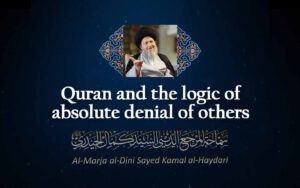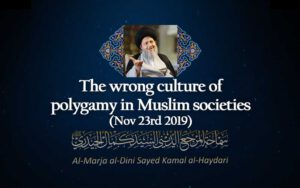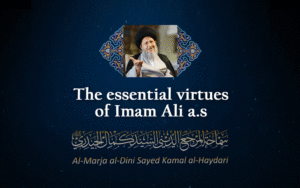2897 words, approximate reading time: 23 min
A Quran-centric Islam; Quran as the axis and Sunnah as the orbit
All Islamic teachings- including beliefs, ethics and jurisprudential issues- should be organized on the basis of Quranic fundamentals and proofs in the first place and the discussions concerning Aḥādīth (narrations) should be held secondary to the verses of Quran and in consistence with them instead of laying the foundations of Islamic sciences and the Islamic worldview based on the Ḥadīth (narration) and marginalizing the Quranic verses and making use of them as mere superficial references.
In the Islam of the Quran, the Quranic verses are the most important and foremost criteria for evaluation and assessment of the correctness of Ḥadīth. Every Ḥadīth, that is in contradiction with the Quran should be set aside even if its Sanad (chain of narrators) is Saḥīḥ (correct) and Mutawatir. On the other hand, in the Islam of the Ḥadīth, a narration is accepted if it is merely mentioned in a source of Ḥadīth (based on the method of the Akhbariūn). If in case a Sanadi and Rijali survey is carried out and the correctness of its Sanad is proved (based on the method of most of the Usūliūn), the narration is deemed to be acceptable without discussing its consistency or inconsistency with the Quranic laws and guidelines in an Ijtihadi methodology of Tafsir. While the logic of the Islam of the Quran says, the trustfulness of the narrators or authenticity of the Ḥadīth book is not enough for the acceptance of Ḥadīth. Instead, irrespective of the Sanad of Ḥadīth being Saḥīḥ or Ḍaīf (weak), it is compared with the Quran in a specific Tafsiri method and if it is found to be compatible with or not against the Quran, it may be subject to argument. This comparison of the traditions with the Quran to assess its compatibility with Quran itself is not a simple task rather, it is a difficult and systematic work that needs a special method and logic.
We have developed a special method to deal with this issue and interested people can read that in the book “Mizan Tasḥīh al-Mawrūth al-Riwaii”. It should be noted that the traditions do not get rejected and defied totally in this view but rather, they are put on the Quranic scale so that only the authentic traditions that are consistent with the Quranic fundamentals are used to understand the Islamic teachings and traditions that are fake, inauthentic and inconsistent with definitive reason and Fiṭrah, do not make way into the field of religious teachings.
To differentiate between religious authority and jurisprudential authority:
A religious authority (al-Marja’ al-Dini) is different from a mere jurisprudential authority (al-Marja’ al-Fiqhi) or a mere theological authority. A religious authority is someone who has knowledge of all the dimensions of religious teachings and is a Mujtahid and expert in all of those fields although relatively and not necessarily the most knowledgeable one. Someone who is a Mujtahid in just one or two fields of Islamic sciences and is oblivious of the other or his information in the other fields is not enough or is not an expert, is not a religious authority in reality, he is in fact just a Marja’ (authority or reference) in his own field of study.
Some of the sciences that a religious authority must have a complete hold on and be a Mujtahid in them are epistemology, mysticism, philosophy, theology, exegesis and hermeneutics and linguistics, Hadith, jurisprudence, Usūl, ethics and he must have a political and social outlook. Although reaching the stage of Ijtihad and specializing in all these sciences is a very difficult task and only a few scholars are able to do it, but despite this it is not impossible! We have various examples of such holistic scholars in the past and we still see such scholars. Someone who only knows jurisprudence is a jurisprudent not a religious expert. Therefore, according to us, such a person is not eligible to be a religious authority.
A religious authority is someone who is a Mujtahid in Usūl al-Dīn as well as Furū al-Dīn.
The need for holism in Islamic sciences and teachings
A religious scholar being holistic means that he should have awareness about different dimensions of religious teachings; but this does not mean general elementary knowledge and understanding of them instead this holism requires a very deep and extensive understanding and reaching Ijtihad- and if possible being a theorist- in these fields. In other words, a holistic and multi-dimensional scholar is someone who is an expert in all three fields of theology, ethics and jurisprudence. If a scholar fulfils this condition (Ijtihad in both Usūl al-Dīn and Furū al-Dīn), he can be called a “Quranic Jurisprudent” i.e. as Faqīh in the general meaning (Mujtahid in all fields of religion) and not a Faqīh in its specific meaning (Mujtahid in one specific filed).
A religious scholar should be a Mujtahid in all fields of theology, ethics and jurisprudence instead of being a Mujtahid in only one of them and have nothing to say in other fields which in fact means being a Muqallid (follower), because when the Quran says in the verse of the “Nafar”
فَلَوْ لا نَفَرَ مِنْ كُلِّ فِرْقَةٍ مِنْهُمْ طائِفَةٌ لِيَتَفَقَّهُوا فِي الدِّينِ وَ لِيُنْذِرُوا قَوْمَهُمْ إِذا رَجَعُوا إِلَيْهِمْ لَعَلَّهُمْ يَحْذَرُون
For there should separate from every division of them a group [remaining] to obtain understanding in the religion and warn their people when they return to them that they might be cautious. (al-Tawbah, v. 122)
It means that one should become a Faqīh in Dīn – which is inclusive of all theological, ethical, educative and jurisprudential issues – not just in jurisprudence which is only a part of Dīn and not its entirety.
The Minimum Criteria for Shi’ism
Shi’ism has only one condition and it is obedience to and following the Ahl al-Bayt (Obligation of obedience).
It should be noted that the other conditions like infallibility, knowledge of the unseen (‘Ilm al-Ghayb), al-Wilayah al-Takwiniyah, Wisatat al-Fayḍ
etc. are not necessary conditions for Shi’ism instead they are conditions for the perfection of Shi’ism.
According to this, whosoever follows Imam ‘Ali and his progeny and prefers them over other Companions of the Prophet in cases of conflict and takes their religion from them, is considered to be a Shi’a even if he does not believe in the other qualities of perfection of the Imams based on argument. According to this basis, a lot more people will be able to come under the banner of Ahl al-Bayt and their school of thought and be able to benefit from their life-giving and character-building teachings. The more conditions we place on the sect itself (conditions which are mostly a result of the Ijtihad and personal understanding of the scholars from the religious texts and have not been mentioned explicitly and clearly by the Imams themselves), the lesser people will be attracted towards Shi’ism.
I do not say that we must not believe their infallibility or their knowledge of the unseen; because I believe in these two issues more than others. What I want to say is that this must not be a condition and criteria for being a Shi’a so that it does not become complicated and difficult for people to identify as Shi’as and be able to come under the upbringing of the Ahl al-Bayt (a.s).
Various reasons for this claim have been discussed in the Kharij course on Imamah extensively.
The theory of permissibility of Following all Divine and Non-Divine Religions
The most important criteria for the legitimacy of religions and sects and the salvation of their followers in the hereafter is having valid arguments and proofs in their hands; So, anyone who has a due reason and proof to belief in the rightness of his religion and really considers it to be right based on those reasons and thus acts on it will be excused and even rewarded in the hereafter.
If the followers of a religion, sect or school of thought really are in pursuit of truth and find the extension of truth in a particular faith after reading, researching and discussing according to their capacity, they will be excused and rewarded in the hereafter and will go to paradise even if they find out their religion to be wrong in the hereafter because he reached a definite conclusion after reading and researching according to his mental capacity since it is outside the intellectual ability of man (Maqam al-Ithbāt) to find out if his beliefs are consistent or inconsistent with the reality (Maqam al-Thubūt) and God does not task anyone with more than their intellectual and rational capacity.
لا يُكَلِّف اللهُ نَفْساً إِلاَّ وُسْعَها
Allah does not charge a soul except [with that within] its capacity. (Surah Baqarah v. 286)
All that the religious scholars believe and all the arguments and reasons that they present to justify their claims are only in their own minds (Maqam al-Ithbāt) but finding out that which of the religions’ beliefs are actually according to the reality and the hidden manuscript, is not in the power of man and only God and the infallibles have the ability to state with assertion and full authority which understanding is in consistence with the reality and based on the divine knowledge and reality of the world. Others can only talk from their own minds (Maqam al-Ithbāt) which may or may not be according to the reality.
The Dominance of “Reason” and “Quran” over “Hadith” and “Consensus”
If we wish to set a criteria for scientific discussions and judgements that is accepted by all as an intellectual reference, we have no other option but the “Quran” and “definitive reason” in contrast to “Ahadith” (narrations), “Ijma’at”(consensuses), “Mashhurat” and “Musallamat” that are not common between the two sides and thus do not have the ability to be the focal point in scientific and religious decisions.
Neither can the Ahl al-Bayt’s school of thought replace Ahl al-Bayt with the Sahaba (Companions), nor can the Sahaba’s school of thought replace them with the Ahl al-Bayt.
Therefore, it is pointless to invite someone to act on something that he does not accept. This is a clear fact that explains why both sides reject each other, in fact, it shows the reason for their ever-increasing and deep opposition to each other. None of these two schools of thought- the Sunnis and Shi’as- has a problem with “definitive reason”. Also, there is no difference of opinion regarding the originality of the Quran as a reference; although there are different methods of understanding the Quran which is not only not wrong, but is a source of scientific progress and a healthy interaction of various thoughts.
Ahadith or narrations (narrated Sunnah as reported by the narrators and not the real Sunnah which has been heard directly from the Ahl al-Bayt) are valid only in case they are consistent with or not against the basic Quranic fundamentals. Otherwise, they cannot be utilized in the process of understanding the religion. If a narration is approved by the Quran or other methods of evaluation, like orders of definitive reason or other authentic narrations can approve and strengthen them, one can rely on it.
A new approach to women’s rights and issues, from the Islamic perspective
The need for a female understanding and interpretation of religion
Undoubtedly man and woman have been created differently from an existential point of view- whether in physical, mental and psychological dimensions or sensual and epistemological ones though this difference is not a means of superiority of men over women or vice versa. This difference in the creation of man and woman results in somehow a difference between their interpretations and understandings of some different issues, especially religious texts. That is, despite the similarities men and women have in terms of understanding religion in various issues, for example the same perception of appreciation towards justice and good manners and condemnation of oppression and tyranny, there are some other issues where their interpretations differ and sometimes contradict each other.
According to us, just like men, women must also come out in to the academic field just like men and present their understanding and interpretations of the religious texts because the male jurists and exegetes (Mufassirin) understand the religious texts in a certain way because of their psychological, mental and epistemological systems- although there might be no intentions as such- in a different and sometimes a contradictory way from that of women.
Therefore, women must become Mujtahids, mystics, jurists, philosophers, theologians, exegetes and experts on Hadith, in short, they must become experts on religion and have their own foundations and present their own interpretations of religion at least in some areas alongside those of men and bravely state that we understand the Quran and narrations in a certain way and you men have understood it wrongly.
Although, this approach should not result in an unreal confrontation and dispute that is based on prejudice and male or female supremacy. Instead, a healthy environment must be provided for a scientific debate in accordance with human, ethical and gender-neutral standards.
The presentation of a female interpretation of religion will have at least two main benefits and effects which shows their importance.
The first benefit: Realization of women’s rights:
The first positive effect of a serious presentation of female interpretations of religion is that the female community can easily explain their needs and rights in their own language- and not via a male voice- and clearly and scientifically state that the understanding of the jurists regarding a certain issue related to women is wrong and it must be corrected according to our interpretation for which we have a strong evidence.
The second benefit: Perfection and deepening of males’ understanding of religion:
Another effect and benefit of a female religious interpretation would be a perfection and deepening of the male understanding of religious teachings, i.e. according to us, not only are not men needless of a female interpretation and not only are not women mentally and intellectually inferior to men, instead men are in need of a female interpretation of religious texts so that they expand and complete their interpretations and understandings of verses and traditions through it.
The hermeneutic and Tafsiri theory of “Unity of intention and Multiplicity of extensions”
This basic principle has been ignored and side-lined generally by thinkers and intellectuals and unfortunately has been a source of a lot of mistakes, misunderstandings and even insults and Takfir of others. The above said principle means that the concept of some religious teachings is unique, clear and definite but its extensions and interpretations might be different and even contradictory for various people. In other words, a lot of religious concepts are unique and constant but their extensions are variable i.e. generally speaking their concept is one but the way they are interpreted and understood are different and multiple and it cannot be otherwise because of the difference in fundamentals and presumptions of various people.
Obviousness of the principal of “Tawhīd” and theoretical nature of its extensions
For example, the concept of Tawhīd and its originality being the most important religious teaching of Islam is unique and constant in nature and its obviousness and clearness cannot be refuted or interpreted by anyone who believes in Islam. That is, we see no scholars, sects or creeds in the history of Islam who claim that according to the Quran, God is not one or according to Islam, there are multiple Gods. The sentence, “God is one” is accepted by the theologians, by the jurists, by the exegetes, by the scholars of Hadīth, by the philosophers and by the mystics. You cannot find even one theologian or philosopher or mystics who claims that according to Islam, God does not exist or He is not singular and Shirk (ascribing partners to God) is correct. Yet, despite the fact that all the Islamic scholars have a consensus on Tawhīd itself and its general meaning, they have so many and some unsolvable differences when it comes to interpretation of this concept. A theologian and a Mashāʾi philosopher believe in “al-Waḥdah al-Tabayuni” between the creator and creature. A Sadrāʾi philosopher consider this relationship to be “al-Waḥdah al-Tashkiki” and the mystics believe in “al-Waḥdat al-Shakhsi”. Similarly, when it comes to interpret the meaning of God being “Waḥid” and “Aḥad”, not only is there a difference of opinion between scholars of various sciences, but scholars of the same branch of science have differences too. For example, theologians of the Ahl al-Hadith, Muʿtazili, Ashʿari, Wahhabi, Maturidi, Twelver Shia, Zaidi Shia, Ismaili Shia etc. all have a different and contradictory interpretation.
Therefore, that which is clear and certain and no Muslim is allowed to do Ijtihad in it, is the originality of Tawhīd and its general meaning otherwise the extension and interpretation of this clear and certain concept is completely theoretical, uncertain and Ijtihad-based unless and until someone claims that his understanding and interpretation of Tawhīd is the utter truth and all other interpretations are void and thus everybody must base their ideas on my understanding!
Although there is no doubt that everybody must present an argument and proof from the religious texts to present his understanding firstly, and secondly, his argument must be strong and bring certainty.



